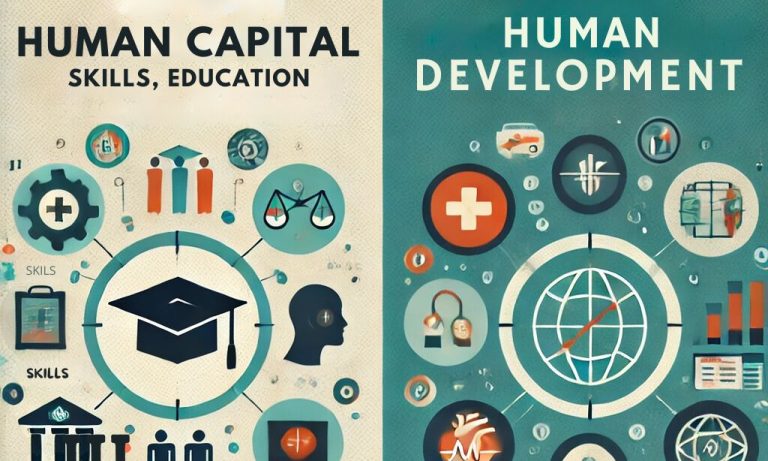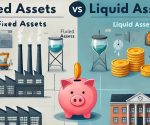The difference between human capital and human development is based on their focus and scope. Human capital refers to the education, skills, and knowledge of people in terms of their productive and economic value. On the other hand, human development is more general and focuses on bringing improvements in general welfare, which can be education, health, and welfare. Policymakers and organizations have to understand these differences while trying to develop economic growth and bring welfare to society.
What is Human Capital?
Human capital is the collective skills, knowledge, and abilities of people that can benefit them in terms of economic productivity. Hence, the term emphasizes the fact that people, like physical capital, are assets to be augmented through an investment in education, training, and health. Human capital is a significant factor in influencing growth, innovation, and organizational success.
For example, A software developer improves coding skills through certification courses, A teacher gains expertise by attending professional development programs, and A healthcare worker enhances efficiency through specialized training.
Characteristics of Human Capital
Human capital represents the collective skills, knowledge, and abilities of individuals that contribute to economic productivity. Its key characteristics include:
- Skill-Based: Includes technical, professional, and soft skills.
- Economic Focus: Aims to enhance productivity and earning potential.
- Investment-Oriented: Grows through education, training, and healthcare.
- Quantifiable: Often measured in terms of education levels, job performance, and economic output.
What is Human Development?
Human development is a comprehensive concept that focuses on improving the overall quality of life and well-being of individuals. It goes beyond economic productivity to address critical aspects such as health, education, freedom, and opportunities for personal growth. The Human Development Index (HDI) is often used as a measure to assess a country’s progress in human development.
A government implementing universal healthcare to improve life expectancy, Initiatives to increase school enrollment rates among marginalized communities, and Policies promoting gender equality and social inclusion.
Characteristics of Human Development
Human development focuses on enhancing the overall well-being and quality of life for individuals and communities. Its key characteristics include:
- Holistic Approach: Encompasses health, education, income, and opportunities.
- Focus on Well-Being: Prioritizes improving life quality over economic output alone.
- Rights-Based: Emphasizes equity, freedom, and dignity for all individuals.
- Long-Term Impact: Aims to create sustainable development and inclusive societal progress.
Components of Human Development
Human development is built on key components that aim to improve individual and societal well-being. These include:
- Health: Ensuring access to medical care, nutrition, and clean water.
- Education: Providing quality education to enable personal and professional growth.
- Living Standards: Enhancing income levels and access to basic services.
- Freedom and Equality: Promoting opportunities regardless of gender, class, or ethnicity.
Differences Between Human Capital & Human Development
Understanding the difference between human capital and human development is essential for aligning personal, organizational, and national goals. Here’s a detailed comparison:
Definition
- Human Capital: Human capital refers to the skills, knowledge, experience, and abilities that individuals acquire, which contribute to economic productivity. It emphasizes the economic value of people’s capabilities and their role in generating income and economic growth.
- Human Development: Human development is a broader concept that focuses on enhancing the overall well-being of individuals. It aims to improve various aspects of life, including health, education, living standards, and social inclusion, ensuring that people lead fulfilling and equitable lives.
Scope
- Human Capital: The scope of human capital is narrower, as it primarily revolves around workforce contributions and economic outcomes. It views individuals in terms of their potential to enhance productivity and financial performance within an economy.
- Human Development: Human development has a much broader scope, encompassing economic, social, cultural, and personal dimensions of well-being. It considers factors like freedom, equality, and access to opportunities, along with economic and workforce aspects.
Objective
- Human Capital: The main objective of human capital is to maximize economic returns by improving productivity and efficiency. Investments in education, training, and skill development are geared toward achieving better economic outcomes.
- Human Development: Human development focuses on improving the quality of life, ensuring equity, and providing opportunities for individuals to reach their full potential. It aims for comprehensive growth, emphasizing dignity, freedom, and social justice.
Measurement
- Human Capital: Human capital is measured through indicators such as education levels, professional skills, workforce productivity, and contributions to Gross Domestic Product (GDP). These metrics quantify an individual’s or a group’s economic potential.
- Human Development: Human development is evaluated using broader metrics like the Human Development Index (HDI), which considers life expectancy, literacy rates, and per capita income. Other measures may include health outcomes, access to education, and social equality indicators.
Relationship
- Human Capital: Human capital is a subset of human development, focusing specifically on workforce-related capabilities. While it contributes to economic growth, it is only one dimension of an individual’s overall development.
- Human Development: Human development encompasses human capital along with other elements such as health, equality, freedom, and personal fulfillment. It considers the holistic growth of individuals and societies rather than just economic contributions.
| Aspect | Human Capital | Human Development |
| Definition | Focuses on the skills, knowledge, and abilities that enhance economic productivity. | Centers on improving overall well-being, including health, education, and living standards. |
| Scope | Narrower focuses on economic and workforce contributions. | Broader scope encompassing social, economic, and personal dimensions. |
| Objective | Aims to maximize economic returns and productivity. | Seeks to enhance life quality and ensure equity and dignity for all. |
| Measurement | Quantified using education levels, workforce skills, or GDP contribution. | Measured using the Human Development Index (HDI), life expectancy, and literacy rates. |
| Relationship | Serves as a component of human development, focusing on workforce capabilities. | Includes human capital as one of its aspects, alongside health, freedom, and equality. |
Relationship Between Human Capital & Human Development
Although human capital and human development differ significantly, they are also very interconnected. Human development usually increases human capital. For example:
- Education: A critical component of human development also builds skills and knowledge, directly enhancing human capital.
- Health: The quality of healthcare improved. A healthier workforce meant greater productivity and economic value.
- Living Standards: Greater income and opportunities support both personal well-being and economic contribution.
Conclusion
Human capital and human development vary in their approach and scope. Human capital focuses on developing economic productivity, with skills and education representing the major goal, whereas human development aims to promote overall well-being by considering health, education, and equality. Two important concepts are needed for sustainable growth and social development. Identifying their differences and interrelations helps governments, organizations, and individuals identify their investments in both areas of economic and social benefit.
Human Capital vs Human Development FAQs
In what ways are human capital and human development distinct?
Human capital refers to increasing the productivity of an economy through skills and education, while human development pertains to developmental issues that enhance human living conditions.
How are human capital and human development linked?
The investments made towards human development, including education and healthcare, form part of the direct building of human capital, creating a skilled and healthy workforce.
What is the role of education in human capital and human development?
Education develops human capital by increasing skills and productivity and supports human development by empowering individuals and improving life quality.
How is human development measured?
Human development is assessed through the Human Development Index, which considers health, education, and income levels.
Why is there a need to know the difference between human capital and human development?
Once understood, it will enable the formulation of policies that may balance economic growth with social equity and individual empowerment.


